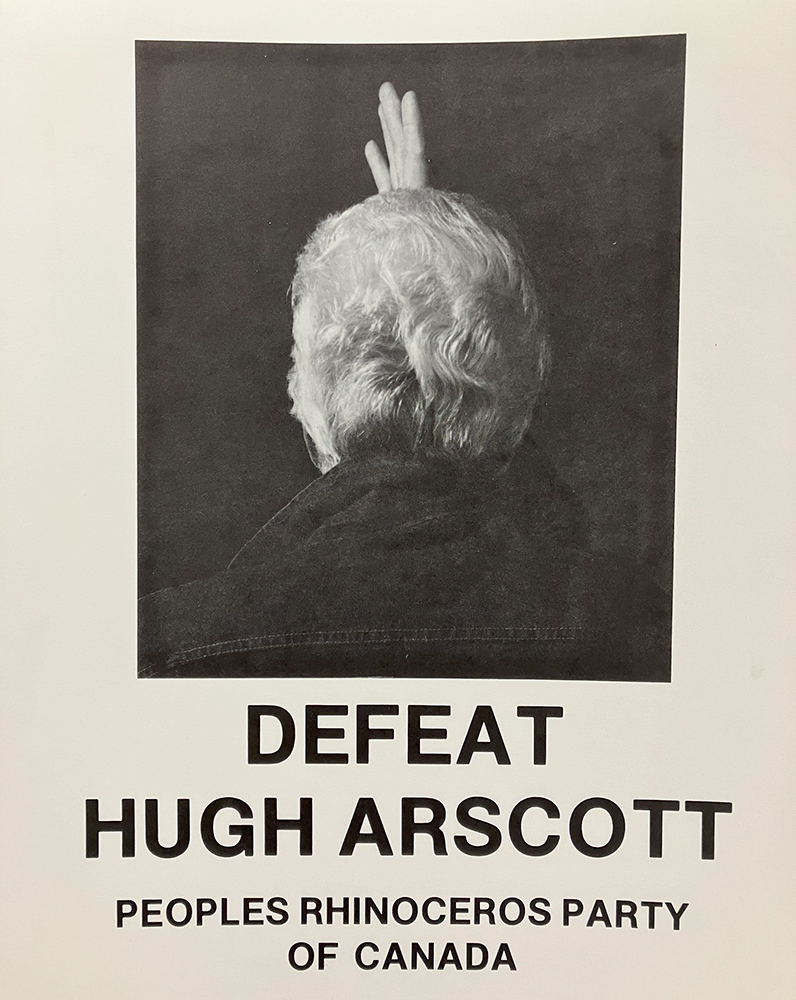 Menu
Menu
 Menu
Menu
“Even reformers eventually need reforming.”
From Premier Tommy Douglas to Prime Minister John Diefenbaker, Saskatchewan is home to political giants. But not everyone who shaped our civic life has done so by being elected. Such is the story of Hugh Arscott, a community-minded citizen who gained clout by not being elected.
Arscott was a Saskatoon-based life insurance broker, highly regarded for his volunteer work and his satirical writing.
Politically, Arscott’s formative years were spent with the Progressive Conservatives. By his early 40s, he had developed a relationship with John Diefenbaker, unsuccessfully run in two provincial by-elections, and helped organise Eloise Jones’ victorious 1964 run for Parliament, at a time when only four women sat in the House of Commons.
Somewhere along the way, Arscott grew disillusioned with mainstream political parties. He resigned from the Progressive Conservatives in 1968, not long after Diefenbaker was deposed as party leader. He later said that “I felt we were being conned, by all the parties.”

Arscott campaign poster, 1980. As he said, “Nothing should be taken too seriously or fanatically.”
Nevertheless, Arscott never lost faith in Canada, its constitution, or its people. He turned his sense of humour into involvement with the satirical Rhinoceros Party.
Arscott first ran as a Rhinoceros candidate in the 1980 federal election, in the riding of Saskatoon East. For him, Rhinos represented the liberal tradition of freedom of expression. They had no chance of getting elected, but they encouraged participation in the democratic process. In fact, Arscott repeatedly asked people not to vote for him.
Arscott’s campaign was satirical, but his underlying beliefs were serious. He held media events, spoke at candidate forums, and canvassed the city to offer good laughs and hear people’s views.
Arscott tried to nominate his dog Boh as Rhino candidate for Saskatoon West
To illustrate how easy it was to get on a ballot, Arscott tried to nominate his dog Boh as Rhino candidate for Saskatoon West. He suggested that Canada’s inadequate senior citizen pensions could be solved by reissuing birth certificates. That way, nobody would reach retirement age. And he steadfastly pledged that “we will not keep our promises,” adding that “the other parties have already stolen that plank.”
Not everyone laughed. When he said Canada’s energy crisis could be solved by having children pull trucks and buses, an enraged StarPhoenix reader responded that “if we as Saskatonians and Canadians accept and tolerate this kind of humor, then we indeed must be sick.”
Perhaps we were sick. Arscott lost the election, but his prominence only grew. He had a regular feature in the Saskatoon StarPhoenix, continued to serve local organisations, and was even a featured speaker and debater on topics as consequential as Canada’s constitution.
When Hugh Arscott passed away in 2002, former Saskatoon politician Pat Lorje called him “gracious and polite and caring to a fault.” As she told the StarPhoenix, “Hugh and I probably—definitely—had differing political ideas, but we certainly had a good meeting of the minds about the basic truths of what’s important—democracy and respect for all people, and a strong sense of community.”
Perhaps even more than his satirical bent, Hugh Arscott’s values of decency and community are his lasting legacy.
The Rhinoceros Party began in Quebec in 1963 as a satirical movement to criticise Canadian politics. During the 1970s, the party gained a national following, peaking in the 1980 election with over 100,000 votes nation-wide.
The Rhinos faded away in the 1990s due in-part to electoral law changes. However, they recently re-emerged in federal elections. As well, the party president is an organiser of the Longest Ballot Committee, a movement that floods ballots with dozens of candidates to protest for electoral reform.
The party was inspired by a Brazilian rhinoceros named Cacareco. In São Paulo’s 1959 civic election, voters rallied behind her as a protest vote. She received 100,000 write-in votes, more than any other candidate.